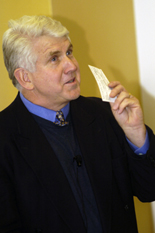News Story
Metcalfe: "Invention is a flower, innovation is a weed."

Robert Metcalfe
"The status quo is vicious and resourceful. So you need to be obnoxious to succeed."
Robert Metcalfe, Ethernet inventor and Whiting-Turner lecturer, Dec. 8, 2005
Some of his major topics were luck (and being prepared for it), innovation (and the steps it requires), the "Ethernet business model" (and its broad applicability to technology-based enterprises) and the messy task of being an entrepeneur in a world where "no one changes his mind, ever," and "progess occurs one funeral at a time." (To view the lecture, click on the link below.)
He stated that everyone likes the idea of innovation until they see it. Then conformity steps in. "The status quo is vicious and resourceful. So you need to be obnoxious to succeed." He noted that all innovators begin as hip revolutionaries and end as monsters—even Google, once everyone's darling, is now perceived as evil. "Invention is a flower," he noted, "innovation is a weed."
So why become an entrepreneur? Because that's how progress is achieved, and fortunes made. Metcalfe stressed that only the biggest monopolies—Bell, Xerox, Microsoft—can afford the research that drives innovation, and that obtaining such research is not worth the damage monopolies cause. That leaves the government (the biggest monopoly of all) and its support of university-based research, which he endorses—if only universities were "better managed."
At the conclusion of the lecture, Dean Nariman Farvardin presented Dr. Metcalfe with the Clark School's Technology Business Leadership Award.
Published December 9, 2005









